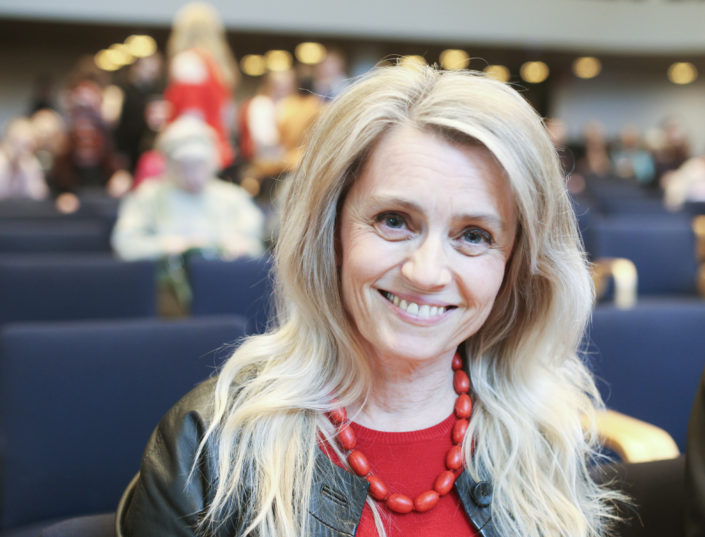Blog Post
Finnish MP investigated by police for defending biblical definition of marriage
Back in May, I wrote an article for First Things based on an interview I conducted with Finnish politician Päivi Räsänen, who has been subject to numerous police investigations for a booklet she wrote defending the biblical definition of marriage. Only a small portion of our long interview could be utilized for the article, so I am publishing the rest of our conversation here for anyone interested.
Why were you the subject of two police investigations, and what did the police interrogate you about?
The Finnish Police Force is conducting four separate criminal investigations against me. In all these cases, I am accused of criminal agitation against a minority group, primarily for quoting the Bible in a tweet; for a 16-year old pamphlet about marriage and sexual ethics; and for speaking according to my Christian faith in two radio and television programs. According to the Criminal Code of our country, this crime carries the sentence of a fine or imprisonment for a maximum of two years.
Last June, I was shocked when I heard that the Evangelical Lutheran Church of Finland, which I am a member of, announced its official affiliation to Helsinki LGBT Pride 2019. I posted my tweet alongside a picture of a Bible passage, Romans 1:24-27 that describes same-sex relationships as shameful and sinful, and asked how the church’s doctrinal foundation, the Bible, can be compatible with lifting something the Bible calls shameful and sinful. This decision of the church undermines people’s trust on the Bible. I wanted to point out that we can trust God’s holy word with questions related to marriage and sexual ethics also today. The purpose of my tweet was in no way to insult sexual minorities. My criticism was aimed at the leadership of the church.
A citizen made a criminal complaint against me and the police started a criminal investigation about my tweet in August. On 1 November 2019, I spent nearly four hours in a police interrogation which concentrated on the main concepts of the Christian faith. I was asked about the contents of the Letter to the Romans and what I meant by saying that practicing homosexuality is a sin and a shame. I answered that all of us are sinners, but the sinfulness of practicing homosexuality is nowadays denied. It did not even occur to me that this tweet might be considered illegal.
The second police investigation has to do with a pamphlet I wrote in 2004: “Male and female He created them: Homosexual relationships challenge the Christian concept of humanity.” The pamphlet takes a stand on sexuality and marriage from a Christian perspective. The police summoned me on 2 March 2020 for interrogation on suspicion of crime. The interrogation lasted some five and a half hours. I felt I was given the opportunity to explain everything essential regarding my booklet and its background. Deep down, the booklet is not about simply the defence of marriage between a man and a woman, but about how and on what basis we are eternally saved through belief in the Bible, the Word of God. The two other investigations concern a tv program, in which I discussed with the tv host the Bible, the significance of Jesus, of sin and of grace. The fourth case concerns my appearance in one episode of a TV program of the Finnish Broadcasting Corporation’s Talk Show series with the host, on the topic “What would Jesus think about homosexuals?”
It is a baffling, surreal experience to be under police investigation over the teachings of the Bible in a country which has such deep roots in the freedom of speech and of religion. It is a grave violation of the freedom of religion if the right to agree with biblical teaching is contravened. The Parliament of Finland has unanimously approved the Church Law according to which the national church, the Evangelical Lutheran Church of Finland, confesses the Christian faith based on the Bible.
Where is your case currently at?
The preliminary investigation of my tweet from last summer has been completed, and that case is now under consideration for whether to raise criminal charges. I have already been interrogated on two separate occasions by the Helsinki Central Police, and now there will be at least two further interrogations. I have understood that the interrogations about the TV and radio programmes will be held soon.
After the police have finished the criminal investigations, the police will send their decision to the Prosecutor General. These police investigations will lead to consideration of charges, which will result either in a prosecution or acquittal. Depending on the decision of the Prosecutor General, the cases will be handled by court. If the Prosecutor General decides to prosecute, it is likely that this will be a process of several years. I am surprised that the investigations continue at these cases that have deeply to do with freedom of religion and free speech.
If Finland upholds freedom of speech and freedom of religion, why have you been targeted for your views on sexuality, gender, and marriage?
Freedom of speech, freedom of religion and freedom of expression are firmly guaranteed under International Human Rights Treaties and in the Constitution of Finland. My case is a precedent.
The criminal complaints have been lodged by ordinary citizens. It is worth noting that previously the police had reached decisions regarding both of the programs–that there was no reason to initiate a preliminary investigation as no crime had been committed. However, the Prosecutor General ordered that the police must conduct these criminal investigations. The police arrived at a similar conclusion last autumn with respect to my pamphlet. Nonetheless, the Prosecutor General proceeded to order a preliminary investigation also of the booklet.
These requests for investigations and the criminal procedures arising out of them are attempts to restrict free speech and freedom of religion. The same kind of development is visible in the whole of Europe. However, it is strange that we have gone so far in Finland. It makes me think of Finlandization: we were once afraid to publicly criticize the Soviet Union. Nowadays it is politically incorrect to say anything negative about gender ideology. The Christian view of man is currently attacked in many ways. The breaking of the Christian worldview is visible both in the societal discussions and in the decision making, whether we are thinking of pro-life issues and the protection of life both in the beginning and in the end of life, or views related to marriage.
Does the Finnish public support the legal campaign against you?
The problem is that many of the conservative-minded people are silent about these issues, whereas the advocacy groups of sexual minorities are very aggressive and well organized and have strongly affected the development of the church, the media and people’s minds. The media’s viewpoint is biased, and it tends continually to give more space and voice to liberal perspectives regarding these issues.
I am thankful that I have got so much support both from Finland and from abroad. I see it as a wonderful privilege that so many are praying for Finland, me and my family. We are, however, living at a time when the effect of Christian culture to the society is narrowing. Although many Finns still belong to Christian churches and denominations, the basic teachings of the Christian faith are no longer views of the majority. Having a traditional view of marriage has become a politically incorrect view in public discussions.
Do you believe that persecution is coming for Christians who believe in traditional biblical values?
According to our law, it is legal to speak and preach about what the Bible teaches. However, it seems that expressing opinions relating to, for example, marriage belonging between one man and one woman, or the sinfulness of homosexual acts, is politically incorrect, subject to silencing, and frowned upon.
It is important to bear in mind that there is no universally agreed definition of ‘hate speech’. As a Christian, I think that if someone expresses an opinion that is against my faith or my conscience, it does not mean that I have been threatened, defamed or insulted the way the Criminal Code means it. As we are living in a democratic country, we must be able to disagree and express our disagreement. I believe the best response is more debate, not censorship. If expressing Bible-based views will become more intolerable and considered to have the constituent elements of agitation against an ethnic group, then spreading the Bible or offering access to it should logically be criminalized.
The Christian view of human beings is based on the inherent and equal dignity of all persons. The teachings concerning marriage and sexuality in the Bible arise from love, not hate. The core message of faith, i.e. grace and atonement, is founded on the Christian view of humanity seen in creation, on the one hand, and the great fall, on the other. The question here is about the core of Christian faith; how a person gets saved into unity with God and into everlasting life though the redemptive sacrifice of Jesus.
If you lose your case, what are the implications for Finnish Christians?
There is a difficulty here greater than a sentence of a fine or an imprisonment. The problem would be a possible demand for censorship: an order to remove my social media postings or a ban on the publication of the pamphlet. This might open an avenue leading to further publication bans and modern book burnings. The mere fact that there is a police interrogation of this endangers the freedoms of speech and of religion by acting as a determent. I am concerned that other countries will follow, by way of persuasive precedent, should this prosecution against me prevail and I was condemned.
Concurrently, there is a danger that the media and publishers will begin to limit certain topics of discussion and leave particular discussions outside public discourse. We must not yield to the vicious circle of fear and being silenced. Freedom of religion is strongly guaranteed and protected both in our Constitution and in the International Human Right Treaties. In practice, a major threat for the freedom of religion is that we don’t use this right. These rights belong to also us parliamentarians. The more we keep silent about controversial topics, the narrower the space for freedom of speech and religion gets.
Do you see any worrying signs throughout the West, and what would your warning to Westerners be?
It is very problematic that expressing Christian beliefs is often seen as insulting in the West. For example, marriage between a man and a woman has become a concept that is understood as restrictive, even threatening. The attempt to break down the gender system based on two different genders hurts especially children. It is unfortunate how uncritically the ideology of sexual diversity and LGBT activism has been supported and endorsed even by churches.
I am concerned that in the future Christians will have a higher threshold at citing the Bible or presenting teachings based on the Bible. Many, especially the young people, are afraid that if you are labelled as a Bible-believing Christian, it will hinder your career and social acceptance. It seems that many Christians in my country are now hiding and going to the closet now that the LGBT community has come out to the public.
I think this whole chain of events is part of my calling as a Christian influencer. Regardless of the final outcome of this criminal investigation, I intend to continue to use the freedom of religion granted to me in the Constitution of Finland and in human rights agreements in order to share the teachings of the Christian faith and to encourage others to do so as well.
The pamphlet may be downloaded here.








